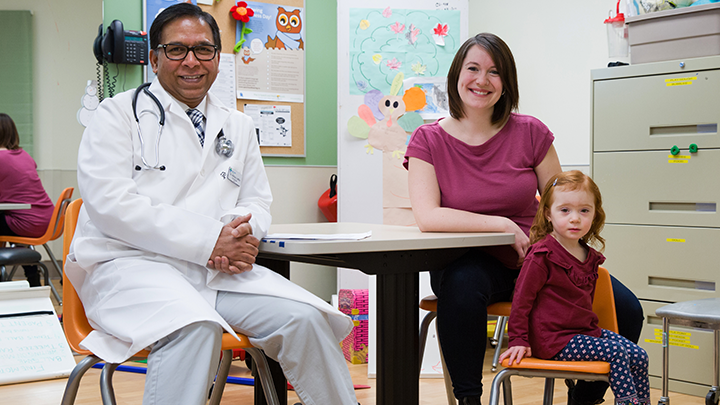
February 6, 2019

Dr. Abhay Lodha enjoys a visit with Avril Strachan and her daughter Anna. Born prematurely at 27 weeks at the Foothills Medical Centre, Anna was given caffeine to help her breathe and boost lung function.
Story by Melanie Veriotes | Photo by Riley Brandt, University of Calgary
CALGARY — Whether in coffee or tea, caffeine is something most of us use to wake up. It turns out that a daily dose of caffeine in the neonatal intensive care unit (NICU) also helps premature babies born under 29 weeks get the best possible start to life. In fact, a new study conducted by University of Calgary researchers shows the earlier the dose of caffeine is given, the better.
“Caffeine is the most commonly used drug in the NICU after antibiotics,” says Dr. Abhay Lodha, MD, associate professor in the departments of Pediatrics and Community Health Sciences at the Cumming School of Medicine and staff neonatologist with Alberta Health Services (AHS).
A 2014 study by Lodha showed starting caffeine therapy within two days after birth shortened the amount of time babies needed to use ventilators and reduced the risk of bronchopulmonary dysplasia, a form of chronic lung disease.
Lodha says it’s believed that caffeine may increase the growth of dendrites, the small branches of a neuron that receive signals from other neurons. “Caffeine may also improve better lung stretch and expansion,
cardiac output and blood pressure in premature infants, which improves oxygen supply throughout the body and brain.”
But further studies were needed. “It’s important that we understand the long-term effects of caffeine as a treatment and ensure these babies are not only surviving, but have quality of life down the road,” says Lodha.
To help answer the question, Lodha collaborated with researchers from the Universities of British Columbia, Montreal, Toronto and Mount Sinai Hospital in Toronto to analyze data from 26 NICUs across Canada.
The team examined data from follow-up assessments conducted at age 18 to 24 months. During these follow-ups, children were assessed for their cognitive, language and motor development using a standardized scoring system to determine developmental functioning in infants and toddlers. They found early caffeine treatment has no long-term negative effects on neurodevelopment, and is actually associated with better cognitive scores, and reduced odds of cerebral palsy and hearing impairment.
Born prematurely at 27 weeks at the Foothills Medical Centre, Kyle and Avril Strachan’s baby, Anna, was given caffeine to help her breathe and boost lung function.
“The doctors told us, with premature babies, their brain hasn’t developed quite enough to let them do all the things their bodies should be doing on its own, like breathing,” says mom Avril. “In the first few weeks, when Anna was feeding, she would slow down or even forget to breathe. This would cause her heart to slow and for her to not get enough oxygen."
To help her breathe, Anna needed a machine to deliver constant airflow to her lungs.
Now two years old, Anna has completed multiple follow-up assessments and is participating in dance classes, gymnastics lessons and swimming like a fish, says her mom Avril.
“It’s wonderful to know that the caffeine treatment has no adverse effects and that if researchers are getting positive findings, it should continue to be the standard of care for premature babies. In that case, I think parents would have no hesitation in having caffeine as part of their child’s treatment.”